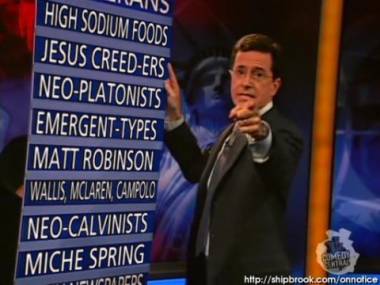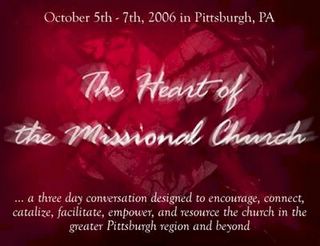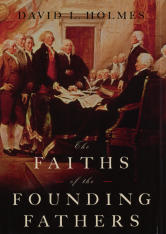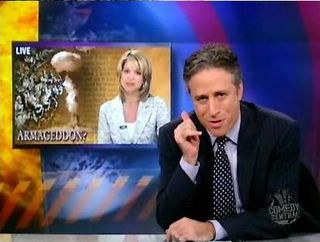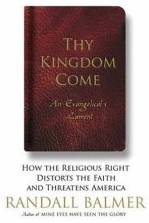
“Did the early church separate itself out into units of the like-minded in terms of ethnicity, class, and language as these megachurches have done?... when we set out with a methodology which we know will create churches that will be culturally, generationally, economically, and racially monolithic and monochromatic, something is amiss.”
To this, Scot writes, “Do we really know that the early Christians didn’t have some niche ministries? In fact, we don’t. We don’t know how they did lots of what they did. I suspect they preached to anyone who would listen — if it was all men, they’d preach to men; if it was all women, they’d preach to women; if it was mixed, they’d preach to mixed crowds; if it was a bunch of philosophical types at the Areopagus, they’d tailor the message to them.”
A commenter (Craig O’Brien) offered this interesting study from Hartford Seminary's Institute for Religion Research (article found at Leadership Network):
The wide-ranging survey includes data on the many attributes that together define the nature and impact of megachurches in our society. Collectively, the results debunk 11 of the most common beliefs about megachurches, namely: MYTH #1: All megachurches are alike.
MYTH #1: All megachurches are alike.
REALITY: They differ in growth rates, size and emphasis.
MYTH #2: All megachurches are equally good at being big.
REALITY: Some clearly understand how to function as a large institution, but others flounder.
MYTH #3: There is an over-emphasis on money in the megachurches.
REALITY: The data disputes this.
MYTH #4: Megachurches exist for spectator worship and are not serious about Christianity.
REALITY: Megachurches generally have high spiritual expectations and serious orthodox beliefs.
MYTH #5: Megachurches are not deeply involved in social ministry.
REALITY: Considerable ministry is taking place at and through these churches.
MYTH #6: All megachurches are pawns of or powerbrokers to George Bush and the Republican Party.
REALITY: The vast majority of megachurches are not politically active.
MYTH #7: All megachurches have huge sanctuaries and enormous campuses.
REALITY: Megachurches make widespread use of multiple worship services over several days, multiple venues and even multiple campuses.
MYTH #8: All megachurches are nondenominational.
REALITY: The vast majority belong to some denomination.
MYTH #9: All megachurches are homogeneous congregations with little diversity.
REALITY: A large and growing number are multi-ethnic and intentionally so.
MYTH #10: Megachurches grow primarily because of great programming.
REALITY: Megachurches grow because excited attendees tell their friends.
MYTH #11: The megachurch phenomenon is on the decline.
REALITY: The data suggests that many more megachurches are on the way.
________
Having been involved in a number of mega-churches in my time in ministry, I must say that to lump all megachurches into one big boat of unbiblical ecclesiology is too simplistic. It is not good exegesis on Wells' part to read back into the fledgling church of the First Century some sort of utopian ideal of diversity and smallness, as if niche ministry is unbiblical and largeness is evil. I seem to remember Peter preaching to over three thousand at Pentecost (no, I wasn't there, I read about it in Acts!). This may not directly represent ecclesiology, but it certainly minimizes the arguments in the Emerging Church that megachurch preachers are somehow less effective.
I have seen good megachurches and bad megachurches. I’ve seen some match the stereotypical trappings of the megachurch “show” with little depth and little true community. I’ve seen others that are constantly seeking to change and innovate and truly disciple and serve in order to be Christ to their community.
I cannot see how “Niche Ministry” is ontologically evil. Paul said "I have become all things to all men so that by all possible means I might save some." What is wrong with churches doing the same? Megachurches have the ability to offer a variety of niche ministries.
I also know of smaller churches that had realized that they themselves had “niched” themselves, and therefore they intentionally planted a church in a neighborhood nearby so that they could reach a different demographic. I applaud this kind of church planting strategy.
We have to face the reality that local churches proclaim Christ in local contexts by people who can reach that particularity. And that’s okay.
Sidebar: What's fascinating about Wells' critique of megachurches is that this is what the emerging church has been saying all along. Yet, Wells' critique is in a book that is subtitled, "Christ in a Postmodern World," and we have already witnessed that Wells has not warmed to many of the EC's ideas for proclaiming Christ in this Postmodern World. It seems, however, that there is more in common here. The EC needs to be fair in its critique of megachurches the same as Wells does!
technorati: spiritual formation, emerging church

 In this month’s issue of Christianity Today ("
In this month’s issue of Christianity Today ("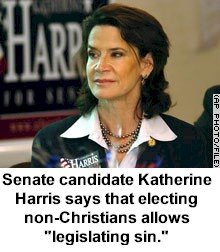


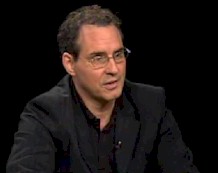 Why did so many people leave Woodland Hills Church when Boyd preached his original message series?
Why did so many people leave Woodland Hills Church when Boyd preached his original message series?
